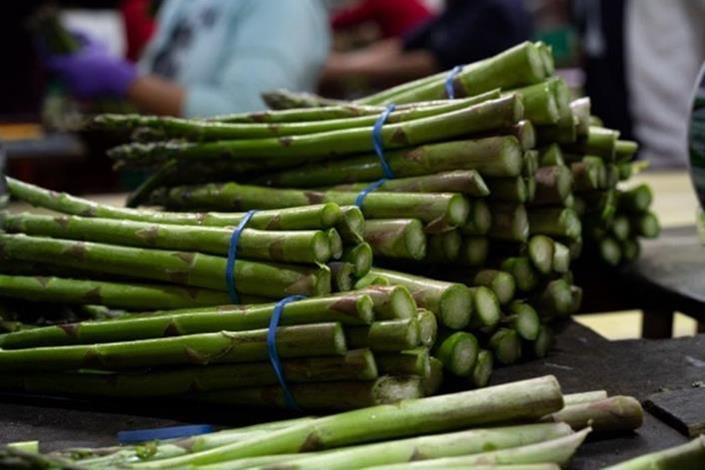Picking the way to a better asparagus future with robotic harvesting
A robotic asparagus harvester project led by growers and supported by the Government is set to reinvigorate the New Zealand asparagus industry by alleviating ongoing labour challenges.
The New Zealand Asparagus Council and Tauranga-based Robotics Plus will work alongside New Zealand asparagus growers to develop a world-first commercial-scale autonomous robotic asparagus harvester to help address ongoing labour shortages in the industry and support growers to tap into high-value export markets.
The Government’s Sustainable Food and Fibre Futures fund is contributing $2.6 million to the $5.83 million project.
“We’re really excited to get this project under way as we simply don’t have enough people to do the work,” says Mangaweka Asparagus grower and NZAC Chair, Sam Rainey.
“Robotic harvesting will be a game-changer for the asparagus industry that currently relies heavily on picking asparagus by hand, which is hard toil. An average picker will walk 10 kilometres per day, so it’s extremely difficult to attract people to do the work.

“Having the ability to access a commercial robotic harvester will also go a long way to helping manage costs, ensuring we can continue to put locally grown fresh asparagus on our plates.”
Steve Saunders, CEO of Robotics Plus, says an autonomous asparagus harvester will alleviate labour constraints, reduce and stabilise costs, and allow New Zealand asparagus to have a more competitive offering in high-value export markets.
Saunders says: “We’re excited to be working with growers and the New Zealand Asparagus Council to ensure we develop a solution that tackles challenges head-on and creates a better future for the asparagus industry.
“It’s an ideal robotics project as green asparagus is conducive to automation as it grows above ground. In addition, it replaces a physically arduous job that only has a brief employment window that growers struggle to attract harvesting labour for.”
The project builds on a prototype harvester robot developed by University of Waikato researchers with Robotics Plus.
Over the last two seasons, Robotics Plus has supported the University of Waikato’s prototype asparagus harvester project led by Dr Shen Hin Lim, Senior Lecturer in Mechatronics and Mechanical Engineering and mainly assisted by PhD student Matthew Peebles and robotics engineer Josh Barnett, and mentored by Professor Mike Duke.
The first prototype robotic asparagus harvester was demonstrated in California in 2019, and the second iteration was trialled in Waikato last year.
Ministry of Business, Innovation and Employment (MBIE) supported the University of Waikato research programme, and Callaghan Innovation supported the PhD fellowship, prototypes and trials.
Saunders says: “These early prototypes have given Robotics Plus great insights into creating a next-generation commercial-scale asparagus harvester and has helped generate strong interest from the asparagus industry.
“With support from the Ministry for Primary Industries, who run the SFF Futures fund, New Zealand Asparagus Council, and ongoing support from the University of Waikato and other partners, we will deliver automation to the asparagus industry at a time when it desperately needs to remain sustainable and keep up with consumer demand for fresh produce.”
Advancing the project to a commercially available asparagus harvester will help increase grower returns and exports, says grower Geoff Lewis of Tendertips.
Saunders says: “However, it’s not just the picking that is important; it’s all the other aspects this technology can bring to the industry, such as yield data and potential add-ons such as packing and even weeding!”
New Zealand Asparagus Council will develop a strong marketing proposition for exporting.
Karen Orr, NZAC business manager, says, “The New Zealand asparagus industry needs to be able to export some of their produce during peak season in late October and November.
“Being able to export excess produce is crucial for grower returns, and the future of domestic asparagus growing. As part of this project, we’ll be creating a unique selling proposition for New Zealand grown asparagus overseas to generate export revenue for the country.
“Half of the cost of producing asparagus is labour. We had thriving asparagus exports in the 80s and 90s, but that has reduced to almost no exports due to increasing costs, particularly for labour. There hasn’t been any investment in the industry’s future because grower returns have been decreasing.
“That’s why we’ve named this project ‘Asparagus Future’ – because this project is our future. We’ll help growers work together with Robotics Plus and MPI to create a future path with this autonomous crop management project.’’
Fresh asparagus accounts for more than 74% of the global market share and has a compound annual growth rate of 3.1 percent. It is the fastest-growing fresh market vegetable per capita consumption throughout North America, with forecasts predicting the fresh market valuation close to $30 billion by 2027.

